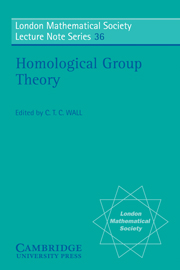Book contents
- Frontmatter
- Contents
- Preface
- Introduction
- 1 Traces and Euler characteristics
- 2 Groups of virtually finite dimension
- 3 Free abelianised extensions of finite groups
- 4 Arithmetic groups
- 5 Topological methods in group theory
- 6 An example of a finite presented solvable group
- 7 SL3(Fq[t]) is not finitely presentable
- 8 Two-dimensional Poincaré duality groups and pairs
- 9 Metabelian quotients of finitely presented soluble groups are finitely presented
- 10 Soluble groups with coherent group rings
- 11 Cohomological aspects of 2-graphs. II
- 12 Recognizing free factors
- 13 Trees of homotopy types of ( m)-complexes
- 14 Geometric structure of surface mapping class groups
- 15 Cohomology theory of aspherical groups and of small cancellation groups
- 16 Finite groups of deficiency zero
- 17 Äquivalenzklassen von Gruppenbeschreibungen, Identitäten und einfacher Homotopietyp in niederen Dimensionen
- 18 Two-dimensional complexes with torsion values not realizable by self-equivalences
- 19 Applications of Nielsen's reduction method to the solution of combinatorial problems in group theory: a survey
- 20 Chevalley groups over polynomial rings
- List of problems
3 - Free abelianised extensions of finite groups
Published online by Cambridge University Press: 05 April 2013
- Frontmatter
- Contents
- Preface
- Introduction
- 1 Traces and Euler characteristics
- 2 Groups of virtually finite dimension
- 3 Free abelianised extensions of finite groups
- 4 Arithmetic groups
- 5 Topological methods in group theory
- 6 An example of a finite presented solvable group
- 7 SL3(Fq[t]) is not finitely presentable
- 8 Two-dimensional Poincaré duality groups and pairs
- 9 Metabelian quotients of finitely presented soluble groups are finitely presented
- 10 Soluble groups with coherent group rings
- 11 Cohomological aspects of 2-graphs. II
- 12 Recognizing free factors
- 13 Trees of homotopy types of ( m)-complexes
- 14 Geometric structure of surface mapping class groups
- 15 Cohomology theory of aspherical groups and of small cancellation groups
- 16 Finite groups of deficiency zero
- 17 Äquivalenzklassen von Gruppenbeschreibungen, Identitäten und einfacher Homotopietyp in niederen Dimensionen
- 18 Two-dimensional complexes with torsion values not realizable by self-equivalences
- 19 Applications of Nielsen's reduction method to the solution of combinatorial problems in group theory: a survey
- 20 Chevalley groups over polynomial rings
- List of problems
Summary
The central subject matter of these notes is the class of groups of the form F/[R, R], where F is a finitely generated free group and F/R is isomorphic to a given finite group G. Lecture 1 deals with the relations between different such covering groups of a fixed group G; Lecture 2 with their decompositions; and Lecture 3 with their generation properties.
The lectures constitute a report on the present state of knowledge concerning these topics. I have tried to explain fully the various concepts that arise and the connexions between them, but I have had to omit almost all proofs. Nevertheless, I hope that this account will be found accessible by the reader who is interested in presentations of groups but does not have the rather specialised background in module theory necessary for many proofs. This background might be called ‘the K0-theory of finite groups’. Perhaps the best reference for it is Swan's volume in the Springer Lecture Notes series, no. 149 (‘K-theory of finite groups and orders’).
FREE EXTENSIONS AND THE COMPARISON PROBLEM
Introduction
Problems connected with presentations of groups arise within group theory in two essentially different contexts. In the first of these, we are given a group by means of generators and relations and wish to deduce structural information about the group. The theory of free products and the theory of groups with a single defining relation are typical examples of this situation.
- Type
- Chapter
- Information
- Homological Group Theory , pp. 71 - 104Publisher: Cambridge University PressPrint publication year: 1979
- 5
- Cited by



